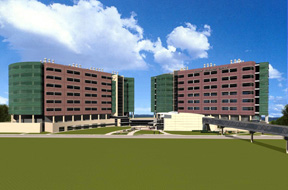 A second research tower at UNMC would improve the health and biosecurity of Nebraskans by providing additional infrastructure for biomedical research, biosecurity preparedness and clinical laboratory service. The Research Center of Excellence II would be constructed adjacent to the Durham Research Center, which opened last year.
A second research tower at UNMC would improve the health and biosecurity of Nebraskans by providing additional infrastructure for biomedical research, biosecurity preparedness and clinical laboratory service. The Research Center of Excellence II would be constructed adjacent to the Durham Research Center, which opened last year.
“The Research Center of Excellence II will allow us to recruit medical scientists who will perform ground-breaking research into cures and treatments for many types of cancer and other diseases,” Dr. Maurer said. “The building also is essential to further elevate Nebraska’s national presence in biosecurity.”
The University of Nebraska Board of Regents will consider a program statement for the RCE II at its meeting on Friday, Oct. 29.
The second tower is needed, campus officials say, to sustain UNMC’s momentum in increasing its research funding. Over the past five years, that research funding has more than doubled and now exceeds $68 million annually. Before the end of this decade, UNMC aims to reach $200 million.
A key component of reaching that goal is recruiting scientists who already are funded through agencies such as the National Institutes of Health, said Thomas Rosenquist, Ph.D., vice chancellor for research at UNMC.
“Certainly, a second research tower will be a significant tool in recruiting talented medical scientists, which is necessary if we are to reach our goals. We’ve already seen this with the Durham Research Center, which already is full despite a very competitive space allocation process,” Dr. Rosenquist said. “Our research growth allows us to provide the latest, state-of-the-art treatments for all of our patients, who ultimately are the biggest benefactors of this new building.”
If approved, the Research Center of Excellence II would be a 10-level, 242,000-square-foot building that is similar in architectural design to the DRC. Construction could begin in January 2006, with substantial completion tentatively scheduled for October 2007.
Funding for the $74 million building would come through a public/private partnership, much like the Durham Research Center. Already, the Nebraska Legislature approved a plan to appropriate $12 million in non-state general fund resources, contingent upon UNMC receiving $30 million in private support. The state support is intended primarily to construct bioterrorism preparedness laboratories within the RCE II. The remaining costs will be covered from private sources and federal funds.
Research activities within the building will be multidisciplinary and problem-based, grouped around UNMC priority areas, including cancer, biosecurity, cardiovascular diseases, gastrointestinal and liver diseases, developmental biology, genetics and molecular genetics, neurobiology, and organ transplantation biology.
The building would provide 96 laboratory modules and associated offices and administrative space. Most of those laboratories would be dedicated to various targeted areas within the College of Medicine and the Eppley Institute for Cancer and Allied Diseases. Other areas will be dedicated to biosecurity, the Nebraska Public Health Laboratory (NPHL), and the clinical pathology laboratories of UNMC’s partner, The Nebraska Medical Center.